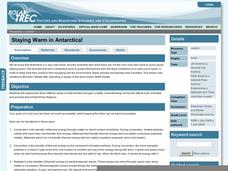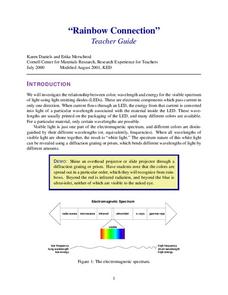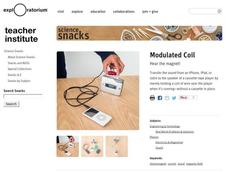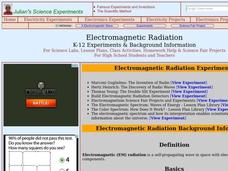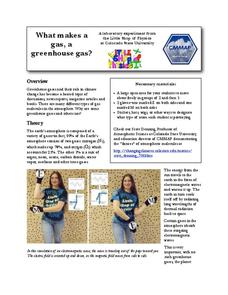Polar Trec
Staying Warm in Antarctica!
Has your class ever wondered how animals and scientists stay warm in the Polar Regions? Kids will investigate to understand the three types of heat transfer and how heat transfer affects those trying to stay toasty in sub-zero...
Cornell University
Shedding a "Little" Light on Cancer Surgery
Many types of cancer treatments now depend on nanotechnology—a big "little" discovery. Scholars begin by removing "malignant" tissue from simulated brains, one using fluorescent markers thanks to nanotechnology and one without. This...
WeTransfer BV
Paper by FiftyThree
There is no such thing as someone who is not artistic when using this app. In fact, this is the type of app that makes you want to go out and buy a tablet computer. Whether you have a creative lesson planned, or just need a place to take...
Curated OER
The Sonnet Challenge
Young scholars are given information about two popular sonnet forms-English and Italian. They are given the rules for writing a sonnet. Students are asked what type of sonnet they would use. They are each given a sheet of paper and...
Cornell University
LEDs Rainbow Connection
View LED lights through the eyes of a scientist. Young scholars learn to view light as a wave frequency and connect various frequencies to different colors on the light spectrum. A lab activity asks groups to measure the frequency of...
Curated OER
Plate Tectonics: Fifth Grade Lesson Plans and Activities
Fifth graders continue their investigation of the plate tectonics cycle with an exploration of the movement of Earth's crust. During the lab, young geologists conduct an experiment to discover the result of different types of...
Exploratorium
Modulated Coil
Transmit sound with an electromagnet. Class members follow the provided direction and build an electromagnet that will transmit sound though a cassette-tape player. As as extension they create an air core electromagnet and...
Curated OER
Looking at the World in a Different Light
In this activity, 7th graders relate colors to wavelengths of light; explain how we see colors and describe types of waves and their technological applications. Students go through a tour and answers questions to the quiz as they go...
Curated OER
Electromagnetic Radiation
Students explore the nature of electromagnetic spectrum through a series of experiments. In this physics lesson, students determine how light behaves under certain circumstances. They explain how humans perceive colors.
Curated OER
AC Waveforms
In this AC waveforms learning exercise, students answer ten questions about AC voltage, frequencies of waveforms and they interpret diagrams of AC voltage.
Curated OER
Woodwind Instruments and Pitch
Students explore musical pitch. In this cross curriculum musical instruments and "sound" physics lesson, students identify and describe common traits of woodwind instruments. Students research "pitch" and what causes pitch fluctuation by...
Curated OER
Light Lab
In this light and the eye worksheet, students perform eight tests to show the blind spot in the human eye, to demonstrate Benham's disk, to show how polarized lenses work, to show how light scatters, to demonstrate fiber...
Curated OER
IPC Physics Final Review
In this physics review worksheet, students compare experimental variable, simple machines, and Newton's Laws. Students calculate kinetic energy, work, power, speed, and velocity. Students review conduction, convection, and radiation....
Curated OER
Jeopardy 8th Grade (Science)
There are so many topics touched upon in this Jeopardy-style science game, that it is difficult to classify! The categories include electricity, matter, ecology, earth and space, and scientific investigation. This would best be used at...
Santa Monica College
Flame Tests of Metal Cations
Scientists used flame tests to identify elements long before the invention of emission spectroscopy. Young chemists observe a flame test of five metal cations in the fourth instructional activity of an 11-part series. Individuals then...
Colorado State University
What Makes a Gas, a Greenhouse Gas?—The Carbon Dioxide Dance
Investigate a heated topic in environmental science. Scholars team up to play the parts of gas molecules in the atmosphere. As the teacher moves about, acting as the electromagnetic wave, learners react as their molecules would to the...
National Energy Education Development Project
The Science of Energy
Did you know the word energy comes from energeia, a Greek word? Introduce learners to the four types of potential energy, five types of kinetic energy, and energy transformation with a presentation about where we get our energy and...
American Museum of Natural History
Earthquakes Tremors From Below
Earthquakes are really no one's fault. A thorough lesson explains the different types of earthquakes how they happen. Learners interact with the online lesson to simulate earthquakes and examine their results. The lesson is appropriate...
Curated OER
Plate Tectonics: Third Grade Lesson Plans and Activities
Third graders examine plate movements and boundaries with a lab that demonstrates how volcanoes and earthquakes are formed. It presents different types of stresses an object can withstand through a hands-on...
Science Friday
Microorganisms on the Move
You can't b. cereus until you see this instructional activity! Young microbiologists learn to prepare deep well slides, observe two types of microorganisms, and compare and contrast their physical characteristics in this interactive and...
Curated OER
Regolith Formation
Students explain the difference between regolith formation on Earth and the Moon. In this space science lesson, students model the different factors affecting regolith formation on Earth. They identify the different types of weathering.
Curated OER
Spherical Mirrors
Some formatting issues will need repair (a few overlapping text boxes and pictures), but overall this is a comprehensive presentation on how light reflects off of spherical mirrors. Both convex and concave mirrors are explained,...
Curated OER
Why Be Active?
Are there benefits to being physically active? Yes! There are both short-term and long-term benefits! Being physically active doesn't just have strengthen you physically, but also emotionally and socially. Learners find out how to...
Exploratorium
Hot Spot
Not only does a concave mirror focus light waves, it can also concentrate infrared radiation into a hot spot. If you have a small electric heater and such a mirror, demonstrate this for your physical science class.
